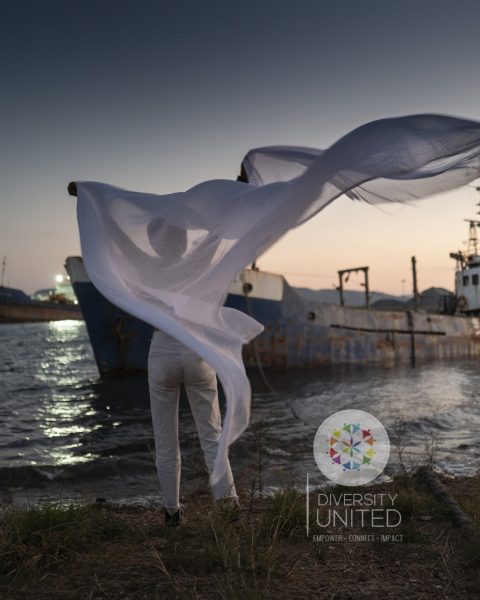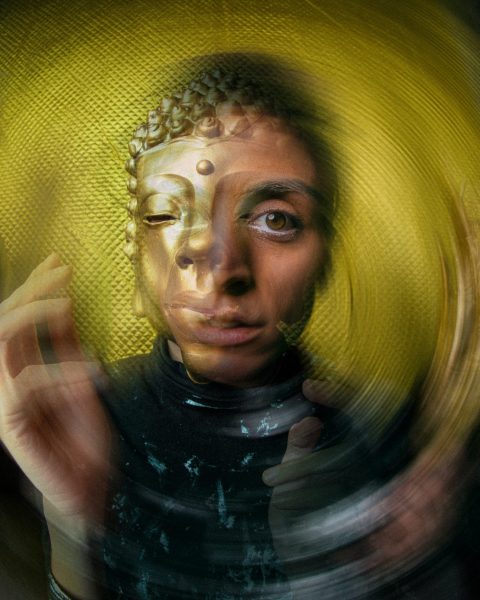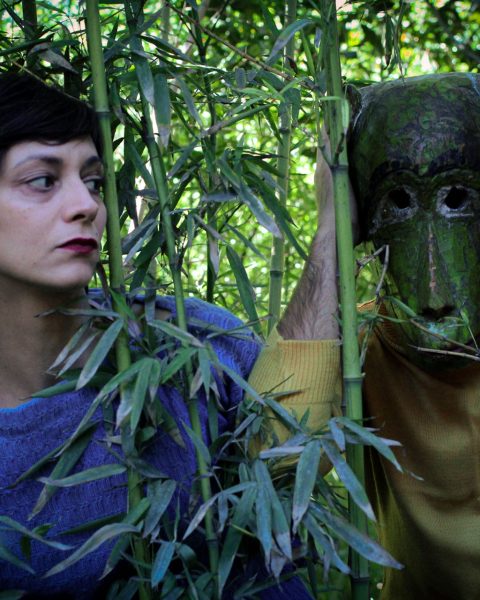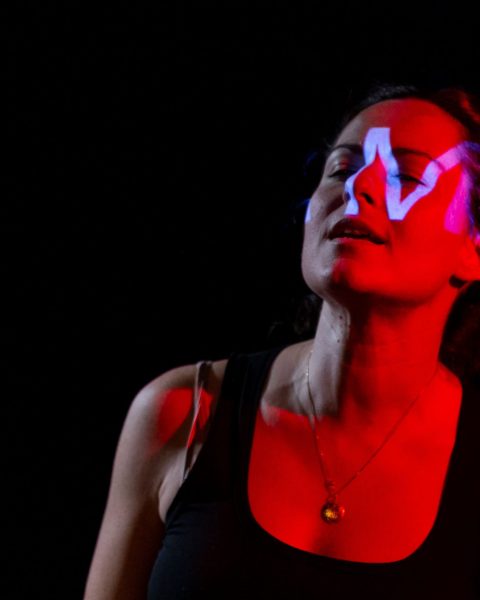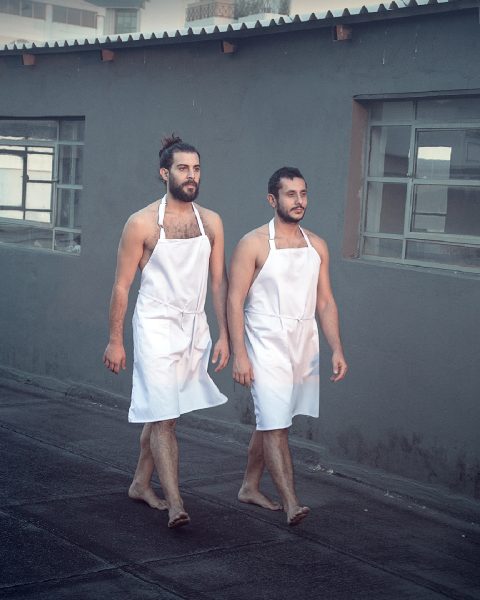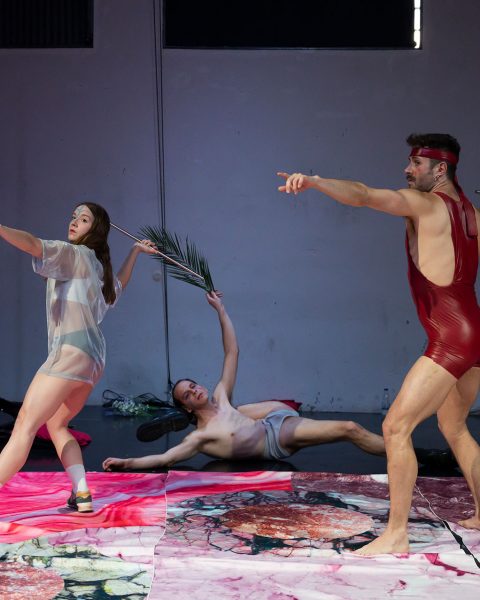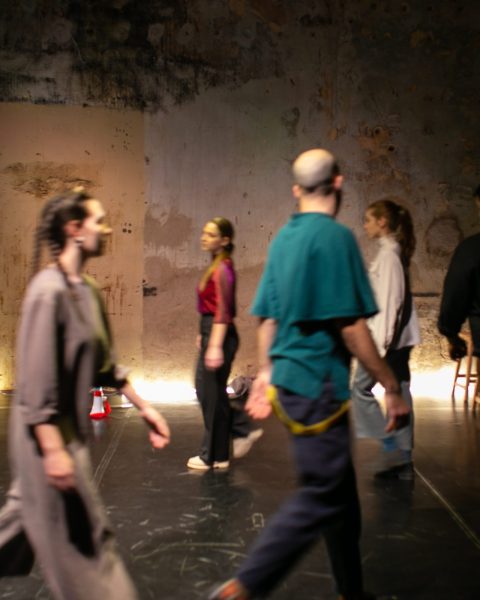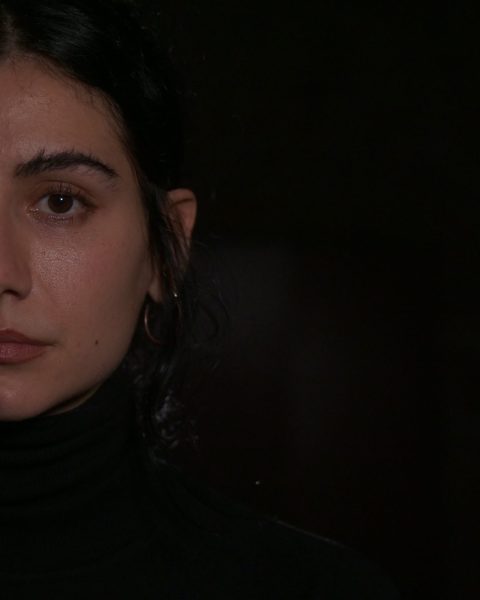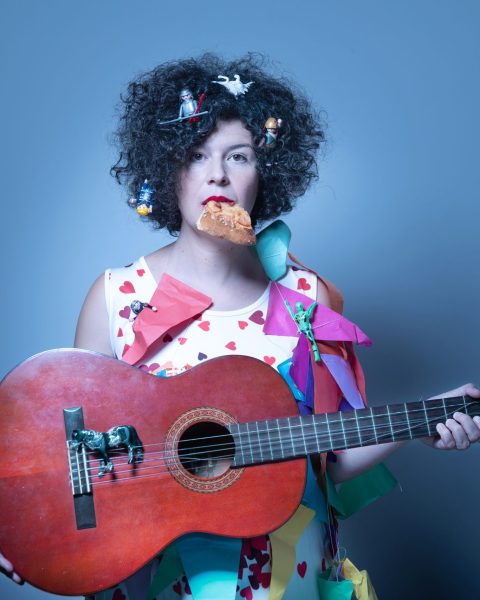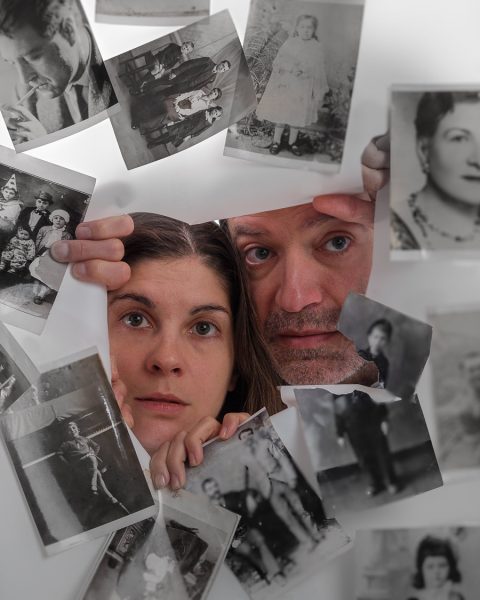BLUE by Anna Lemonaki comes for the third year from Geneva to PLYFA for a few performances.
It is a contemporary performative work where language is mixed with music. An actress and a musician tune in and bring the viewer to the heart of the personal truth hidden behind anxiety.
Man has always felt stress. However, we notice the generative causes of stress changing over the years. It’s different to be anxious because you learn that the Earth is not flat but round and afraid of falling into space, than to hear your heart beating faster and faster thinking you’re going to go into cardiac arrest.
Contrary to earlier times, where ignorance was what threatened man by causing him fear and anxiety, today it is over-information. BLUE is a performance that deals with endogenous and exogenous stress, its psychosomatic symptoms and the vulnerability of the individual . With a text as raw as poetic but also through the energy of rock and roll, the author of the play and actress on stage, Anna Lemonaki, exposes herself with disarming honesty, claiming to share universal but often unacknowledged questions .
The dominant element of the show is water which nourishes everything and forever. A source of life and rejuvenation for nature and man, a symbol of purification and purification, water in continuous flow preserves and cleans the environment inside and around us, mobilizes the body and benefits the soul in many ways.
BLUE is the first part of a theatrical color pentalogy created by the theater group “Bleu en Haut Bleu en Bas” (Blue Above Blue Below) based in Switzerland and first presented in 2016 in Geneva. Since then, he has been hosted on theater stages in Greece, Cyprus, Switzerland, France, Lebanon, and at major international festivals (Festival La Bâtie, Festival Plein Tube, etc.). and will be performed at the Teatro de Barrio, in Madrid, in 2024.
After the success of her last project G.O.L.D. premiered at the Festival de la Bâtie in August 2022, Anna returns to Greece with Blue for a few performances only
In Switzerland, after Blue, Anna uploaded Bloody Fuchsia, White, G.O.L.D. (Glory or Little Dreams) and is now preparing Black – What a Beaty-Full Catastrophe which will be staged at the Comédie de Genève in 2025.
At the same time, she is preparing her first choreographic project and film Kiss and Fly.
Excerpt from the text
“Who’s afraid to swim over seaweed? Who is afraid of his tears? or smile more than he should? Old age? The aging dreams? Unemployment? And of course I’m talking about emotional unemployment. Responsibility; Bringing a child into the world? tell your child the truth? Open your palm and let your child fly wherever his appetite takes him? Do you forget the child you once were? Say No and support it? Say yes to risk. Say sorry when you’ve messed up. Sorry, I was bullshitting. WHO IS AFRAID TO OPEN THEIR EYES AND LOOK AROUND? To experience the happiness that knocks on your door? To open the door, to live a passionate love, do you remember when you were fifteen years old how you blushed in seconds on the cheeks, chest and hell?
WHO IS AFRAID OF LIVING A HORMONICALLY ALIVE LIFE?”
Anna Lemonaki’s note
40 million European adults aged 18 to 54 suffer from anxiety disorders. What happens when we suddenly become cautious about life and instead of living it we become mere spectators? Our first urge is to dive into the sea, but the water is cold. And we don’t want to take the risk of an ocean flu. We are careful and deprived of the ocean. I feel the need to state that anxiety disorders in any form should be a public issue and that is why I decided to do this project. The more and openly we talk about the faces of anxiety (panic attacks, phobias, post-traumatic stress…) the easier we will understand that this black surface at the bottom of the sea is nothing but seaweed and nothing else. BLUE is a manifesto of words and sounds against the stigma that accompanies mental illness.
Every creation is for me an opportunity to take a risk. I take risks by choosing subjects that scare me. These are topics that I find dizzying. In my work as a director, writer and actor I always work focusing on contrasts. Passing from certainty to uncertainty, from tenderness to cruelty, from a narrow passage to a vast space, from romance to vulgarity, from silence to scream, from tension
BIOGRAPHY OF ANNA LEMONAKI
Anna was born in Athens. It grows in Panama, Crete and Athens. He obtained a degree in Political Science in Athens and Bergen in 2006 and a master’s degree in Sociology and Media from the University of Friborg. He studied at the Serge Martin Theater School (Geneva) and graduated in 2013. He attends workshops with Susan Batson at Interkunst (Berlin, 2014 and 2017), with Andreas Manolikakis (President of the Actors Studio, New York) in Athens and with Damian De Schrijver (TgStan, Belgium) in Geneva in 2018. Followed by CAS in Acting and Text Dramaturgy at HETSR and the University of Lausanne (2018-2020).
Anna performs roles for Lena Kitsopoulou in Haire Nymfi (2013), Red Riding Hood – First Blood (2015) and Cry (2018-2021) at the Saint-Gervais Theater in Geneva and at the Techni Theater. He collaborates with, among others, Philippe Quesne, Nikos Karathanos, Adina Secretan, the theater company Cie Daniel Blake for the theater venture Opa (2nd prize – PREMIO 2017). In the cinema he plays the lead role in the film La nuit est encore jeune [The night is still long], directed by Sri Lankan native Indika Udugampola (Promising Director Award at the Colombo International Festival, 2015). She founded the experimental theater and music company Cie Bleu en Haut Bleu en Bas together with the musician Samuel Schmidiger (2015) and presented the first two parts of her quintet, BLEU and FUCHSIA SAIGNANT at the La Bâtie festival in 2019 and the third part BLANC ( SSA Prize, 2020) in Le Grütli (2021). Presents the show P.E.T.U.L.A. bye bye (2017) at the Saint-Gervais theater and at KET in Athens. She is invited by Le Poche theater and directs the play SAPPHOx, written by Sarah-Jane Moloney (2020). In 2002 he presents the G.O.L.D. at the La Bâtie festival. He works as a writer and dramaturg for the dance work Bis N.S (as usual) by the choreographer Ioannis Mantafounis at the Lyon Opera (2021) and the work A la carte at the Frankfurt Dresden Ballet Company (2023). In 2023/2024 he makes the dance-climbing performance and film Kiss and Fly in Leonidio and Tarifa and prepares the play Black : What a Beauty-Full Catastrophe (2025, Comédie de Genève, Geneva).
Interviews
LIFO
She writes and directs her plays herself, but the process that makes her happy is the second one, being able to compose her performances collectively and on stage. She is the only Greek woman active in the theater this side of Switzerland and I ask to know what this means for a foreigner, how she approaches the system.
EDITORS’ NEWSPAPER
For those of you wondering why the name is unfamiliar to us, the reason is simple: Anna has been based in Geneva for many years. There, in the context of the historic La Bâtie Festival, she presented her new work “G.O.L.D.”, a study of failure with poetry, humor and sensitivity, and a brilliant group of performers – we hope to see it in Athens.
Immediately after the last performance, in the heat of the moment, in the courtyard of a wonderful theater by the river, we talked about its progress. Here is Anna Lemonaki, a charismatic artist of the diaspora.
Critique
ελculture
Although the description of the – indeed bleak – theme of “Blue” could lead one to expect an almost unpleasant sight, this is not the case at all. This very closeness that its creator establishes between us and herself, leads to a redemptive condition. Like our fears, placed through her touch next to the fears of others, but also our own us, to be eased. As if the very democratization of trauma exorcises it. As if this moisture flooding the scene creates a matrix within which we can safely expose ourselves. And if the tension still brings a tear to our eyes, the most likely thing is that we will leave the room with a smile.
